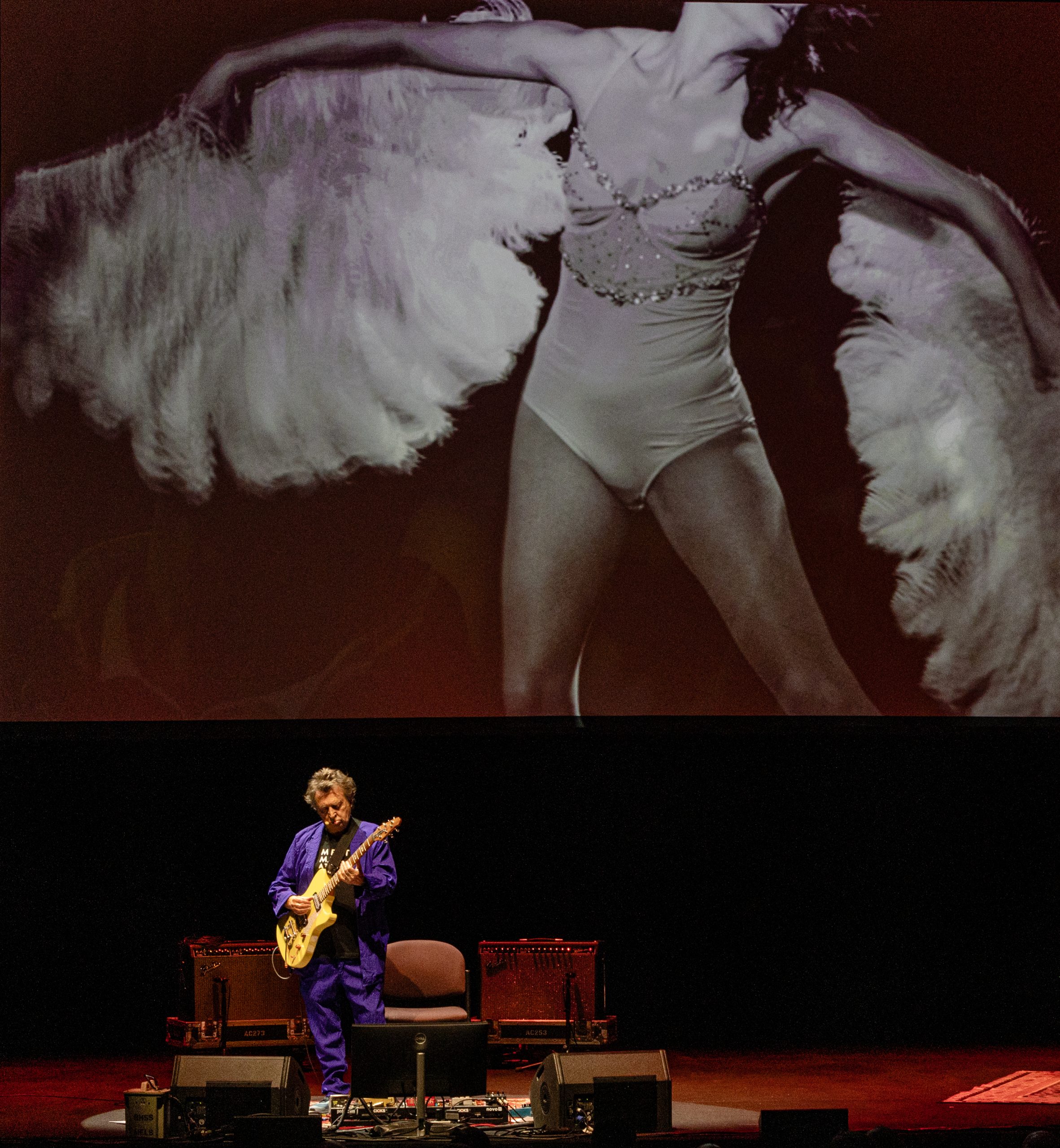I’m sitting in the dimly lit City Recital Hall in Sydney, waiting for Andy Summers to take the stage, a legend whose legacy with The Police precedes him. But tonight, it’s not just about nostalgia; it’s about a man who has spent decades refusing to rest on his laurels. Summers has always been more than the guitar hero of a stadium rock band. His solo career, a fusion of jazz, rock, and avant-garde experimentation, has been its own uncharted territory.
Summers has released 13 solo albums, each as exploratory as his collaborations with Robert Fripp, Herbie Hancock, and King Crimson. Albums like Charming Snakes (1990) and Synaesthesia (1995) showcase his relentless curiosity, bridging jazz-rock fusion with cinematic soundscapes that play like scores for films that exist only in his mind. Then there are the actual soundtracks—Summers scored cult comedies like Down and Out in Beverly Hills (1986) and Weekend at Bernie’s (1989), not that you’d expect anything conventional from him.
His photography has been equally revered, with exhibits around the world, proving his creative drive extends far beyond his fretboard. This is a man who, after winning five Grammys and being inducted into the Rock & Roll Hall of Fame, hasn’t stopped searching, creating, pushing.
Summers strolls onto the stage in a blue suit and black T shirt with the words “Meet Me at the Spa” printed on it. There’s no band, no elaborate setup. Instead, he plays to a backing tape, letting his guitar take centre stage in a minimalist arrangement that feels almost intimate. Flanking him is a massive video screen, on which a curated gallery of his own photography is displayed and a couch, on which he sits from time to time and is in his rider, or so he tells us. His images, stark and evocative, pulse with the same restless creativity that fuels his music. The imagery doesn’t just complement the sound; it transforms the space, making it feel like we’re inside his head, moving between cities, moments, decades.



He kicks off with a grin, casually lamenting how one of the press butchered the title of his piece “The Bones of Chuang Tzu,” rendering it, hilariously as “The Bones of Twang Zu.” He holds grudges, he says, but there’s a twinkle in his eye. The room cracks up because Summers has lived a life larger than these small errors, but he still loves poking fun at them.



He launches into a memory from a visit to the Sahara, with a guy named Lawrence—it was sandy, he tells us. That dry humour stays intact as he shifts into ‘Tea in the Sahara,’ transporting us to The Police’s Synchronicity era. An anecdote about Thelonious Monk comes up next—Summers, 16 years old, wide-eyed, watching his hero play live. He follows it up with a haunting rendition of “Around Midnight,” a tribute to the man who shaped his sense of music and space.
Before ‘Roxanne,’ he shares a slice of ridiculous history—The Police, judging a contest where women dressed like ‘Roxanne’ on their American tour, for a competition run by a radio station. He flashes a black-and-white image of the winner; and then he slips in a clip of Eddie Murphy singing ‘Roxanne.’
Summers shows a clip of him wandering through Japan with a film crew. Incognito, in a beanie, just another tourist in a country that perfected karaoke culture. As he passes by a karaoke bar, he hears it—the unmistakable, iconic chords of ‘Every Breath You Take’ drifting out into the street.
Summers steps up and joins in, casually singing along with the karaokers, to the song he’s played on a thousand stages. No one notices the guy with the guitar hand until the very end, when he pulls off the beanie. Cue disbelief, jaws dropping—an entire room’s collective gasp as they realise they’ve just karaoked with Andy Summers himself, the very man responsible for the song that just filled the room.
And then there’s the Bali story. Magic mushrooms with John Belushi. Summers, Belushi, and their entourage, sprawled in the mud on a busy street, motorbikes whizzing by. It’s an absurd visual, but that’s the joy of it. Summers has lived through chaos, made art from it, and now stands on stage, a calm eye in the storm of his past, laughing at the absurdity of it all.



The night winds down with ‘Message in a Bottle,’ a final encore that feels like a love letter to both his music and his photography. Black-and-white images from one of the Police’s American tours flicker behind him, each frame reminiscent of Robert Frank’s The Americans, capturing the grit, loneliness, and raw beauty of the country. Summers’ music echoes through the venue, but it’s his photographs that linger—snapshots of a life lived fully, each one telling its own story.
Summers is an icon, not just for his guitar work, but for the way he weaves memories and melodies into something greater. You leave not just entertained but feeling like you’ve seen the world through his lens—sharp, funny, a little bit strange, but always unforgettable.


















No Comment